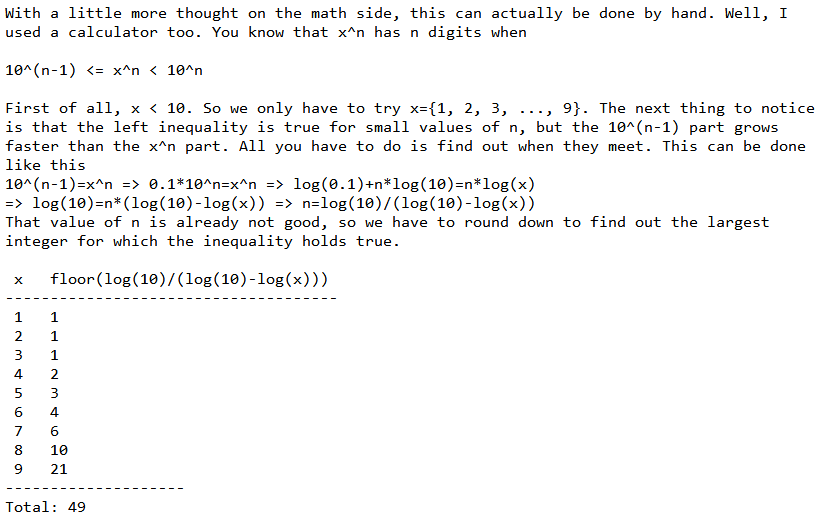The 5-digit number, 16807=75, is also a fifth power. Similarly, the 9-digit number, 134217728=89, is a ninth power.
How many n-digit positive integers exist which are also an nth power?
这个题目有点坑:
先说自己的思路<虽然方法不是很好>
根据题意可知道:
a的b次方 除以 最小的b位数(如:1,10,100,1000) 的商 在 1--9之间,则:a的b次方就是符合题意的
然后就根据这个遍历
先找到第一个数符合条件的数firstnum
再找到第一个符合条件之后的第一个不满足条件的数nextnum
则:这中间有 nextnum - firstnum个数
当b也就是次方数大于18的时候,Long都溢出了
此时:有46个数
下面是程序 :

1 package project61; 2 3 import java.math.BigInteger; 4 5 public class P63{ 6 // a的b次方是b位数 7 // a的b次方 除以 b位的第一个数(如:1000) 商 在1 - 9之间 8 // 以a为开始,找到第一个满足条件的数,如不存在返回 0 9 // 满足条件的数是连续的 10 long findFirst(long Base,int exp){ 11 long res =(long) Math.pow(Base, exp); 12 long d = 1; 13 int Max_Cycle = 10000; 14 int texp = exp; 15 while(exp!=1){ 16 d = d*10; 17 exp--; 18 } 19 boolean flag = true ; 20 int quot = 0; 21 while(Max_Cycle!=0){ 22 quot = (int) (res/d); 23 // System.out.println(quot+"res:"+res+" Base:"+Base+" d:"+d); 24 if(quot>=1 && quot<=9){ 25 return Base; 26 } 27 Base = Base + 1; 28 res = (long) Math.pow(Base, texp); 29 Max_Cycle--; 30 } 31 return 0 ; 32 } 33 34 long findNext(long Base,int exp){ 35 long res =(long) Math.pow(Base, exp); 36 long d = 1; 37 int Max_Cycle = 100000; 38 int texp = exp; 39 while(exp!=1){ 40 d = d*10; 41 exp--; 42 } 43 boolean flag = true ; 44 int quot = 0; 45 while(Max_Cycle!=0){ 46 quot = (int) (res/d); 47 System.out.println("商:"+quot +" 被除数:"+ res+" 除数:"+d+" 底数:"+Base+" 指数:"+texp); 48 if(quot==0 ||quot>9){ 49 50 return Base; 51 } 52 Base = Base + 1; 53 res = (long) Math.pow(Base, texp); 54 Max_Cycle--; 55 } 56 return 0 ; 57 } 58 void run(){ 59 long result = 0; 60 int base = 1; 61 int exp = 1; 62 63 while(exp<=18){ 64 base = 1 ; 65 long firstNum = findFirst(base,exp); 66 if(firstNum !=0){ 67 68 long next = findNext(firstNum,exp); 69 System.out.println("第一个满足条件的底数:"+firstNum +" 第一个不满足条件的底数: "+ next); 70 result = result + next - firstNum; 71 72 } 73 exp++; 74 } 75 System.out.println(result); 76 } 77 78 public static void main(String[] args){ 79 long begin= System.currentTimeMillis(); 80 new P63().run(); 81 long end = System.currentTimeMillis(); 82 long Time = end - begin; 83 System.out.println("Time:"+Time/1000+"s"+Time%1000+"ms"); 84 } 85 }
程序流程:
1.在相同的指数情况小,找符合条件的数
1.1找到第一个符合条件的数的底数
1.2找到符合条件数后面的第一个不符合条件的数
1.3这两个数的差,就是在这个指数下所以符合条件的数
2.增加指数。
下面是运行的结果:

可以看出,只有1-9的底数满足条件,上面红框中的是满足条件后的第一个不满足条件的数。
上面至少知道18,设成18以上,溢出,,,输入上面的46当然是不对的,应该是还有的
尝试直接在9的19,20,21...的数中找符合条件的数:
BigInteger base = new BigInteger("9"); BigInteger bigres = new BigInteger("0"); String toStr = ""; int exp = 18; for(exp=19;exp<25;exp++){ bigres = base.pow(exp); toStr = bigres+""; if(toStr.length() ==exp) System.out.println(toStr); }
通过上面的程序,就只是把符合条件的其他三个数输出了。
答案是:49
上面的过程是不是太复杂了,如果直接利用BigInteger也不会这么复杂的。
然后看到别人是这样做的:

上面说的很详细。。。
void run1(){ int count = 0; for(int x = 1;x<10;x++){ count +=(int)(1.0/(1-Math.log(x)/Math.log(10))); } System.out.println(count); }
程序就成这样的了。。。
Python程序:
from math import log10 s = 0 for n in range(1,10): s += int(1/(1-log10(n))) print "result=",s
Python程序就是这样的了。。。
from math import log10
print sum(map(int, map(lambda a: 1.0/(1.0-log10(a)), range(1, 10))))
Python 也可以这样来。。。
